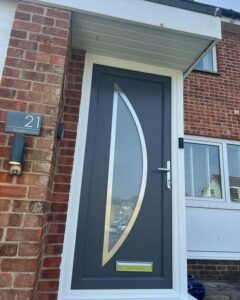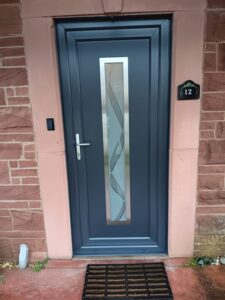Are uPVC Doors Energy Efficient?
Published: 10th June 2024
Are uPVC Doors Energy Efficient?
In today’s environmentally conscious world, energy efficiency in homes and buildings is a priority for many. One way to enhance energy efficiency is through the installation of uPVC doors. This blog explores the energy efficiency of uPVC doors and addresses common questions regarding their performance.
What is uPVC?
uPVC, or unplasticised polyvinyl chloride, is a type of plastic commonly used in building and construction. This material is popular for windows and doors due to its high resistance to weathering, low maintenance needs, and excellent thermal insulation properties.
Are uPVC doors energy efficient?
Yes, uPVC doors are generally considered highly energy efficient. The key reasons for this include:
- Thermal Insulation: uPVC has low thermal conductivity, which means it helps to prevent heat loss in winter and keeps interiors cool in summer. This insulation property reduces the need for heating and cooling, thereby lowering energy consumption. Hurst uPVC door panels are protected by Heat Reflective Technology which when combined with an extra high-density core, provides excellent insulation. This means your door does more than just look great; it also helps block noise and heat from entering or escaping your home.
- Double or Triple Glazing: UPVC door panels that are supplied with double or triple glazing which have multiple layers of glass with inert gas in between which acts as an additional barrier to heat transfer.
- Sealing and Weatherproofing: uPVC doors are designed to be tightly sealed, reducing drafts. This sealing contributes to maintaining a stable indoor temperature.
How Does Door Panel Style Affect Energy Efficiency?
The uPVC door panel style can influence the energy efficiency of uPVC doors:
- Solid Panels: Solid uPVC door panels such as the Windsor Solid uPVC door, provide the best insulation as they have no gaps or glazing that could allow heat transfer.
- Partially Glazed Panels: Doors with glazed sections can still be energy efficient if they use double or triple glazing. These doors offer a balance between natural light and insulation. Such as the Chatsworth One and the Hamburg One uPVC door.
What are the benefits of uPVC doors being energy efficient?
- Cost Savings: uPVC doors are known for their excellent insulation properties. This leads to lower energy bills, saving you money in the long run.
- Increase Your Home Value: Installing energy-efficient doors can help improve your Energy Performance Certificate (EPC) score. An EPC measures the energy efficiency of your entire home and rates it on a scale from A to F, with A being the highest. Most homes typically fall into the D category. According to a Government report, making energy-saving improvements can increase your home’s value by 14-38%.
- Comfort: Maintains a comfortable indoor temperature year-round. Their insulation properties prevent drafts and reduce heat loss, ensuring your home stays warm in the winter and cool in the summer.
- Environmental Impact: uPVC doors help lower your carbon footprint by minimising energy consumption. By reducing the amount of energy needed for heating your home, you contribute to fewer greenhouse gas emissions. This helps to support global efforts to combat climate change.
- Noise Reduction: uPVC doors offer enhanced insulation that reduces noise pollution, creating a quieter indoor environment. The noise reduction is particularly beneficial in urban areas or busy neighbourhoods, where there is a lot of outside noise.
- Long-Term Investment: uPVC doors are a long-term investment that results in financial savings over time. Their durability and high-performance insulation mean they will continue to provide benefits for many years, allowing for increased comfort.
What Can Cause uPVC Doors to Become Less Energy Efficient Over Time?
While uPVC doors are durable and long-lasting, certain factors can reduce their energy efficiency over time:
- Wear and Tear: Over time, the seals around the door can wear out or become damaged, leading to drafts. Regular maintenance and replacement of seals by a professional can prevent this issue.
- Misalignment: Doors can become misaligned due to regular use, causing gaps that allow air to pass through. Ensuring proper installation and periodic adjustments can maintain the door’s efficiency.
- Deterioration of Glazing: The inert gas between double or triple-glazed panels can escape, reducing the insulation properties of the glass. Checking the glazing periodically and replacing the glazed door panel, if necessary, can help maintain energy efficiency.
- Accumulation of Dirt and Debris: Dirt and debris can accumulate in the door tracks and seals, hindering the door’s ability to close properly and form a tight seal. Regular cleaning can prevent this problem.
In conclusion, uPVC doors are an excellent choice for energy efficiency, offering great thermal insulation, especially when combined with quality glazing and proper maintenance. By understanding how different factors impact their performance, homeowners can ensure their uPVC doors continue to provide energy savings for years to come. We would always advise homeowners to seek the advice of a professional installer before attempting to repair any aspect of their door.If you’re looking for an energy efficient uPVC door than take a look at our great range today. With a wide range of styles, colours and glass options we have a uPVC door to suit every home. Find your local installer today.



